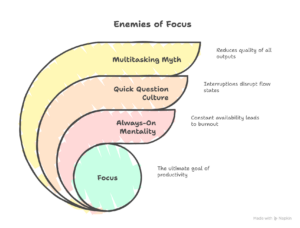You’ve got mail, Sir!
If you are old enough, you’ll probably remember the old AOL notification “You’ve got mail”? That cheerful robotic voice might as well have been saying “You’ve got someone else’s priorities waiting to hijack your day!” Every ping, ding, and notification is essentially the modern equivalent of a random stranger walking into your office and announcing, “Excuse me, but I’ve decided that whatever you’re doing right now is less important than what I want from you.” And the truly absurd part? We’ve designed our entire work lives around these interruptions, then wonder why our most important work remains undone.
Analogy: It’s like installing a doorbell in a meditation room and being surprised when no one achieves enlightenment. Your inbox isn’t a to-do list unless your career aspiration is “professional email responder.” The next time you hear that digital equivalent of “You’ve got mail, sir,” remember: that’s not the sound of productivity—it’s the sound of your priorities being rearranged by someone who doesn’t know what matters most to you.
Most business advice about focus sounds like your grandmother telling you to eat your vegetables. “Stay focused!” they say, as if repeating this mantra will magically eliminate the 147 distractions bombarding your consciousness every minute.
But here’s the truth most productivity gurus won’t tell you: The problem isn’t your ability to focus—it’s that you’re protecting the wrong asset.
The Great Time Protection Fallacy
Everyone talks about time management. It’s a multi-billion-dollar industry built on the premise that if you could just organise your calendar better, color-code your tasks, or find the perfect productivity app, you’d finally reach that mythical state of “peak performance.”
What a magnificent load of nonsense.
Your inbox is filled with other people’s priorities. Your meeting calendar? Often a reflection of someone else’s agenda. And those constant notifications? They’re essentially people tapping you on the shoulder every few minutes asking, “Is this important? What about this? Or this?”
“Strategic focus isn’t about what you decide to do; it’s about what you have the courage to stop doing. The most successful leaders aren’t those with the most options—they’re those who ruthlessly eliminate all options except the essential few.”
The problem isn’t that we don’t understand the importance of focus—it’s that we’ve been looking at the wrong end of the telescope.
Time doesn’t need managing. Time needs protecting. And not just any time—your focused time needs protection with the ferocity of a mother bear guarding her cubs.
Focus isn’t about better to-do lists or the perfect productivity app. Focus is about making choices that matter and being remarkably specific about the change you seek to make.
Why Your Open-Door Policy Is Killing Your Business
“But I need to be accessible to my team!” I hear you protest.
Let me substitute that thinking for you: What if being constantly accessible is actually the most selfish thing you could do?
When you allow every random thought, question, and crisis to access your attention immediately, you’re actually:
- Depriving your organization of your most valuable output—the strategic thinking that only happens in states of deep focus
- Training your team to be dependent rather than resourceful
- Ensuring that your most important work never gets done
In essence, by trying to help everyone all the time, you help no one in any meaningful way.
What separates the professional from the amateur isn’t talent—it’s their approach to focus:
Amateurs dabble. They start projects with enthusiasm but abandon them when the initial excitement fades.
Professionals commit. They show up day after day, focusing on the practice even when they don’t feel like it.
Consider this: The average executive spends approximately 23 minutes getting back on track after being interrupted. Multiply that by the 50+ interruptions faced daily, and you’re looking at a workday with almost no deep focus time.
No wonder so many of us feel perpetually behind.
Combine Your Strengths With Strategic Unavailability
The most productive leaders I’ve worked with have discovered a counterintuitive truth: Their value doesn’t come from being available; it comes from being strategically unavailable.
Here’s your starting point on how to combine this insight with your existing strengths:
Identify your unique cognitive gifts. What type of thinking creates the most value when you’re at your best? Strategic planning? Creative problem-solving? Relationship building? Whatever it is, that’s what deserves protected focus time.
Amplify your impact by clustering similar activities. Your brain isn’t designed for constant context-switching. When you combine similar activities—all your decision-making meetings on Tuesday, deep creative work on Thursday morning—you reduce the immense cognitive load of transitioning between different types of thinking.

Now, here’s how to protect your focus like a professional:
- Start with purpose, not productivity: Ask yourself, “What change am I trying to make?” If you can’t answer with specificity, you don’t have a focus problem—you have a purpose problem.
- Create boundaries that matter: Schedule three 90-minute focus blocks each week as immovable appointments with yourself. Guard these times like crucial client meetings—because they’re more important.
- Eliminate the always-on mentality: Your brain needs periods of focused work followed by genuine rest. Without this rhythm, you’re operating at a fraction of your potential.
- Courage to say no: Focus isn’t the ability to say yes to important things. It’s the courage to say no to merely urgent things.
- Design your environment for focus: Your environment will always win against willpower. Create spaces—both physical and digital—that protect your attention.
Adapt Your Environment or Accept Mediocrity
Your environment will always win against willpower. Always. Yet most of us continue trying to focus in spaces literally designed to fracture our attention.
“Every ‘yes’ you say divides your focus. Every ‘no’ you say multiplies it. The arithmetic of excellence is built on subtraction, not addition.”
Here’s where we need to adapt our approach:
Modify your physical space: Create visual barriers that signal “deep work in progress.” This could be as simple as wearing noise-canceling headphones or as elaborate as establishing a dedicated focus room.
Eliminate digital distractions: The average person checks their phone 96 times daily. Each check derails your train of thought. Be ruthless about notification settings. Your social media updates can wait; your best work cannot.
Put your availability to other uses: What if you repurposed the time you currently spend in reactive mode? Perhaps you could create systems that eliminate the need for those interruptions altogether.
Eliminate the Enemies of Focus
We’ve been conditioned to believe that “busy” equals “important.” It doesn’t. It usually means “unfocused” and “ineffective.”

Here’s what to eliminate:
- The myth of multitasking. It’s not a skill; it’s cognitive impairment. Studies consistently show that attempting to do multiple attention-requiring tasks simultaneously reduces the quality of all outputs.
- The “quick question” culture. There are no quick questions, only interrupted flow states that take 23 minutes to recover from.
- The always-on mentality. Your brain needs periods of focused work followed by genuine rest. Without this rhythm, you’re operating at a fraction of your potential.
Rearrange Your Schedule for Power Hours
The truly revolutionary approach is to reverse the traditional workday structure. Instead of fitting focus time around meetings, fit meetings around your focus time.
Consider scheduling three 90-minute focus blocks each week as immovable appointments with yourself. Guard these times like crucial client meetings—because they’re even more important.
Then, rearrange everything else to accommodate these power hours. This simple change can transform your productivity and strategic contribution.
The Hidden Value Multiplier
When you protect your focus time, something remarkable happens. The gap between fragmented thinking and focused thinking isn’t just quantitative; it’s qualitative. Protected focus time doesn’t just give you more output; it gives you entirely different output.
The solutions, insights, and strategies that emerge from protected focus time are exponentially more valuable than what you produce in fragmented attention states.
This is why focus protection isn’t selfish—it’s essential. Without it, you’ll never create the change you seek to make. You’ll never ship the work that matters.
The Reverse Focus Challenge
Here’s a counterintuitive exercise: For one week, track every time you’re in a state of deep focus. Don’t track distractions or interruptions—track the opposite. How many minutes per day are you actually focused on high-value work?
The answer will likely shock you. Most executives I work with discover they get less than 60 minutes of true focus time daily. Is it any wonder they feel perpetually behind?
The Hidden Value Multiplier
When you protect your focus time, you’re not just getting more done—you’re unlocking an entirely different quality of thinking. The solutions, insights, and strategies that emerge from protected focus time are exponentially more valuable than what you produce in fragmented attention states.
This is the ultimate hidden leverage point in business: The gap between fragmented thinking and focused thinking isn’t just quantitative; it’s qualitative. Protected focus time doesn’t just give you more output; it gives you entirely different output.
Your Focus Protection System Starts Now
Don’t wait for the perfect time to implement a focus protection system. There will never be a convenient moment to change how you allocate your attention.
Start with one protected 90-minute block this week. Communicate boundaries clearly to your team. Turn off all notifications. Close your door or find a private space. Then dive into the most strategically important work you’ve been postponing.
The results will speak for themselves. And once you experience the power of protected focus time, you’ll wonder how you ever worked any other way.
Focus is Your Legacy
Choose wisely what you focus on, because ultimately, you become what you focus on.
The world doesn’t need more distracted people with good intentions. It needs focused professionals who ship work that matters. Work that creates change. Work worth talking about.
“Results don’t follow effort; they follow focused effort. A river scattered across a desert creates a puddle. A river channeled through a narrow canyon creates enough power to light a city.”
In a world of infinite options and constant distractions, the ability to focus on one thing—the right thing—isn’t just a productivity technique. It’s how you create work that endures.
Focus first. The rest will follow.
The choice is yours: Will you be the person who tries to do everything and accomplishes little? Or will you be the professional who does few things—but does them remarkably well?
Remember: Anyone can be busy. Few can be focused. Only the focused change the world.

